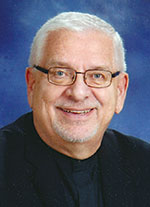Corrections Corner / Deacon Marc Kellams
Restorative justice can transform victims and perpetrators
 In my January Corrections Corner column, I spoke of the overcrowding of jails and prisons, that the wrong people were being incarcerated, including the drug addicted and mentally ill, and the need for reform.
In my January Corrections Corner column, I spoke of the overcrowding of jails and prisons, that the wrong people were being incarcerated, including the drug addicted and mentally ill, and the need for reform.
This month, I want to introduce you to the concept of restorative justice, which is at the forefront of the ever-changing world of corrections.
The concept can mean different things to different people and institutions, but basically it is an acknowledgment that crime is more than just breaking the law, in that it causes harm to relationships, families, victims and the community at large. It recognizes that punishment does nothing to address these harms and often exacerbates them.
The Centre for Justice and Reconciliation’s definition is: “Restorative justice is a theory of justice that emphasizes repairing the harm caused by criminal behavior. It is best accomplished through cooperative processes that allow all willing stakeholders to meet, although other approaches are available when that is impossible. This can lead to transformation of people, relationships and communities.”
By addressing the underlying issues that normally are at the root of the crimes that are perpetrated, offenders are often able to take responsibility for their actions. If they are able to hear from their victims, either in a controlled setting or through some other indirect means, they become more fully aware of the real people they have harmed and how they have harmed them.
Victim offender reconciliation programs facilitate face-to-face meetings, and from these meetings, both the offender and the victim learn to appreciate each other’s situations. The result is that many times forgiveness and redemption occur. It is a simple next step for such a conversion of heart to reduce the propensity for further harm to others.
Victims of crime are real people. So are perpetrators. And as St. Joseph of Medaille Sister Helen Prejean says often, “People are more than the worst thing they have ever done in their lives.”
Howard Zehr, an American criminologist, is considered the pioneer of the modern concept of restorative justice. He espouses that:
-
Crime causes harm and justice requires repairing that harm.
-
The best way to determine how to do that is to have the perpetrator and the victim actively involved in the process of justice.
-
The result is fundamental changes in people, relationships and community.
All crimes are not appropriate for this process, especially where there are victims of violent crimes. Most property-related crimes include outcomes that can also include monetary restitution where victims are made financially whole through the payment of money or in-kind services, and community restitution where offenders volunteer for social service agencies in a community to help “make things right” in a global sense.
Wouldn’t we all be better off if victims participated in the process and were somehow made whole and offenders were allowed to redeem themselves? As Prison Fellowship International states, “We believe all people have value, deserve mercy, and are loved equally by God—even the most outcast.”
To that I say, Amen.
(Deacon Marc Kellams is the Coordinator of Corrections Ministry for the Archdiocese of Indianapolis and a former criminal court judge. He can be reached at mkellams@archindy.org or call 317-592-4012.) †
 In my January Corrections Corner column, I spoke of the overcrowding of jails and prisons, that the wrong people were being incarcerated, including the drug addicted and mentally ill, and the need for reform.
In my January Corrections Corner column, I spoke of the overcrowding of jails and prisons, that the wrong people were being incarcerated, including the drug addicted and mentally ill, and the need for reform.